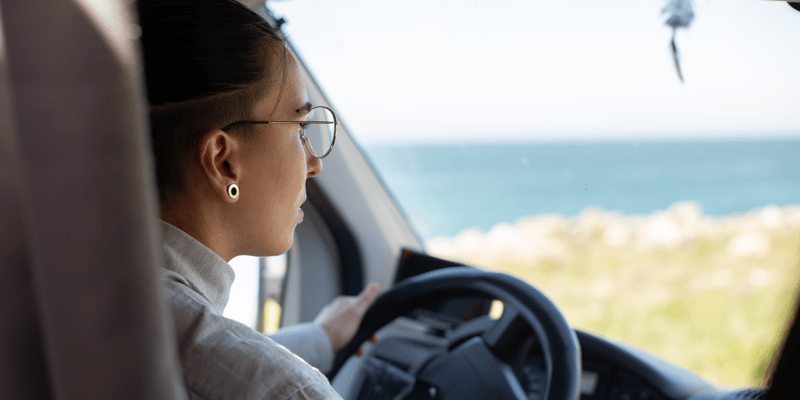Overcome Driving Anxiety

Embark on a journey to conquer driving anxiety and regain your confidence
The roots of driving anxiety
Driving anxiety is more common than what we think. One study by Aviva suggests that a third of drivers in the UK feel anxious behind the wheel. This comes as no surprise to me as according to a recent survey of adults in the UK by the Office for National Statistics, around one in three (34%) adults experience high levels of anxiety. Anxiety has a habit of manifesting in places where you would least expect it to.
I help people overcome all sorts of fears, from fear of confrontation to fear of flying with spiders, dogs, throwing up, public speaking and more in the middle. However, the fear of driving is most unique as it requires a person to confront their anxiety while performing a complex task that demands focus, control and quick decision-making. When I work with people who have aerophobia or the fear of flying, am I may even tell them to visualise certain things or even to put themselves into a hypnotic state while on the plane, so they so that they can allow their body and mind to relax and let go of the anxiety. This is not possible for people who have driving anxiety. On a positive note, this gives us the opportunity to understand ourselves and our anxiety much better and weed it out completely.
Let’s explore the different facets of driving anxiety, its causes, and practical steps to overcome it.
Understanding Driving Anxiety
Driving anxiety can manifest in various forms, each with its own triggers and challenges. Some people may fear driving on highways, while others may feel anxious driving alone or far from home. Others may avoid driving in specific conditions, like at night or in bad weather. Regardless of the specific trigger, driving anxiety often revolves around a few common themes: the fear of losing control, the fear of having a panic attack, or the fear of being involved in an accident.
The role of hypnotherapy in overcoming fear behind the wheel
Hypnotherapy offers a complementary approach to CBT for addressing driving anxiety. Through the use of guided relaxation and visualization techniques, hypnotherapy helps individuals reach a state of deep calm and suggestibility. In this relaxed state, the therapist can introduce positive suggestions and coping strategies directly to the subconscious mind, which is more open to change. This process can help in reducing anxiety by altering ingrained patterns of thought and emotional responses that are often resistant to conscious efforts to change.
While hypnotherapy might seem unconventional, many have found it to be a powerful tool for overcoming fear and anxiety related to driving. It is particularly beneficial for those who may struggle with traditional therapy methods or for whom cognitive approaches have been insufficient. By accessing and modifying the subconscious drivers of anxiety, hypnotherapy can facilitate profound and lasting change.
Common Triggers of Driving Anxiety
1. Past Negative Experiences: Negative experiences such as car accidents, being caught in a severe storm, or even witnessing road rage can trigger driving anxiety. These experiences can replay in your mind, causing you to worry about them happening again. This fear can lead to avoidance behaviour, where the person stops driving altogether, which only exacerbates the anxiety.
2. Driving Outside of Comfort Zones: For some, driving within familiar areas is manageable, but venturing into unknown territory can trigger significant anxiety. The fear of getting lost, running out of fuel, or being in an unfamiliar place without help can be overwhelming. This fear often leads to avoidance of new locations or situations that require driving beyond one’s comfort zone.
3. Fear of Experiencing Panic Symptoms: Those who have experienced panic attacks while driving may develop a fear of being trapped in traffic or other situations where they feel they can’t escape. The physical symptoms of anxiety, such as a racing heart, difficulty breathing, or dizziness, can make driving feel unbearable. The fear of these symptoms occurring can lead to more anxiety and further avoidance of driving.
4. Fear of Losing Control: Some drivers fear that driving too fast or in certain conditions will cause them to lose control of their vehicle. This fear can manifest in behaviours like driving slowly, avoiding highways, or feeling extreme stress while behind the wheel. The fear of losing control can be so intense that it leads to physical symptoms like sweating, shaking, or a racing heart.
5. Fear of Fatal Accidents: The fear of being involved in a fatal accident is another common trigger for driving anxiety. This fear often stems from an exaggerated perception of danger and a lack of confidence in one’s driving abilities or in the actions of other drivers. The constant worry about being in a crash can make driving a highly stressful experience.
The Impact of Driving Anxiety on Daily Life
Having worked with so many clients with this anxiety, I know how it can limit a person’s independence and freedom. It can affect personal relationships, as social activities often require driving. Professionally, it can limit job opportunities, especially in areas where driving is necessary. The avoidance of driving can lead to isolation, as people may be unable to participate in daily activities that require travel. Over time, the anxiety can worsen, making it even more difficult to confront and overcome.
Conclusion
Driving anxiety is a complex problem but it can be overcome using the right tools and techniques. By understanding your specific fears and taking proactive steps to address them, you can regain control and enjoy the freedom that driving offers. Whether you seek professional help through CBT, practice relaxation techniques, or gradually expose yourself to driving situations, overcoming this anxiety is not only possible but can lead to a more fulfilling and independent life.
Remember, the journey to overcoming driving anxiety is not a race; it’s a process that requires patience, persistence, and support. With the right strategies and mindset, you can conquer your fear and get back on the road with confidence.

 By
By


